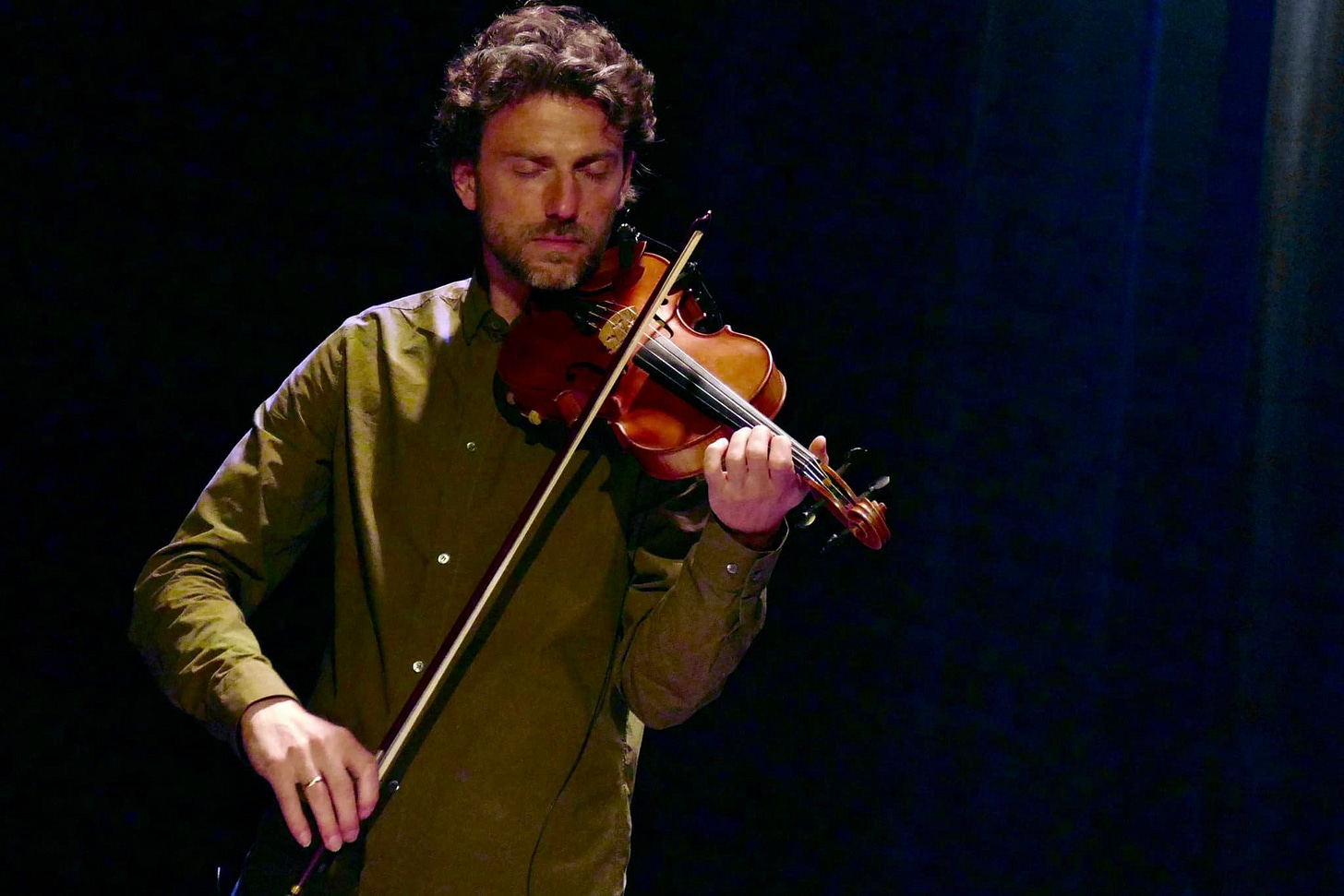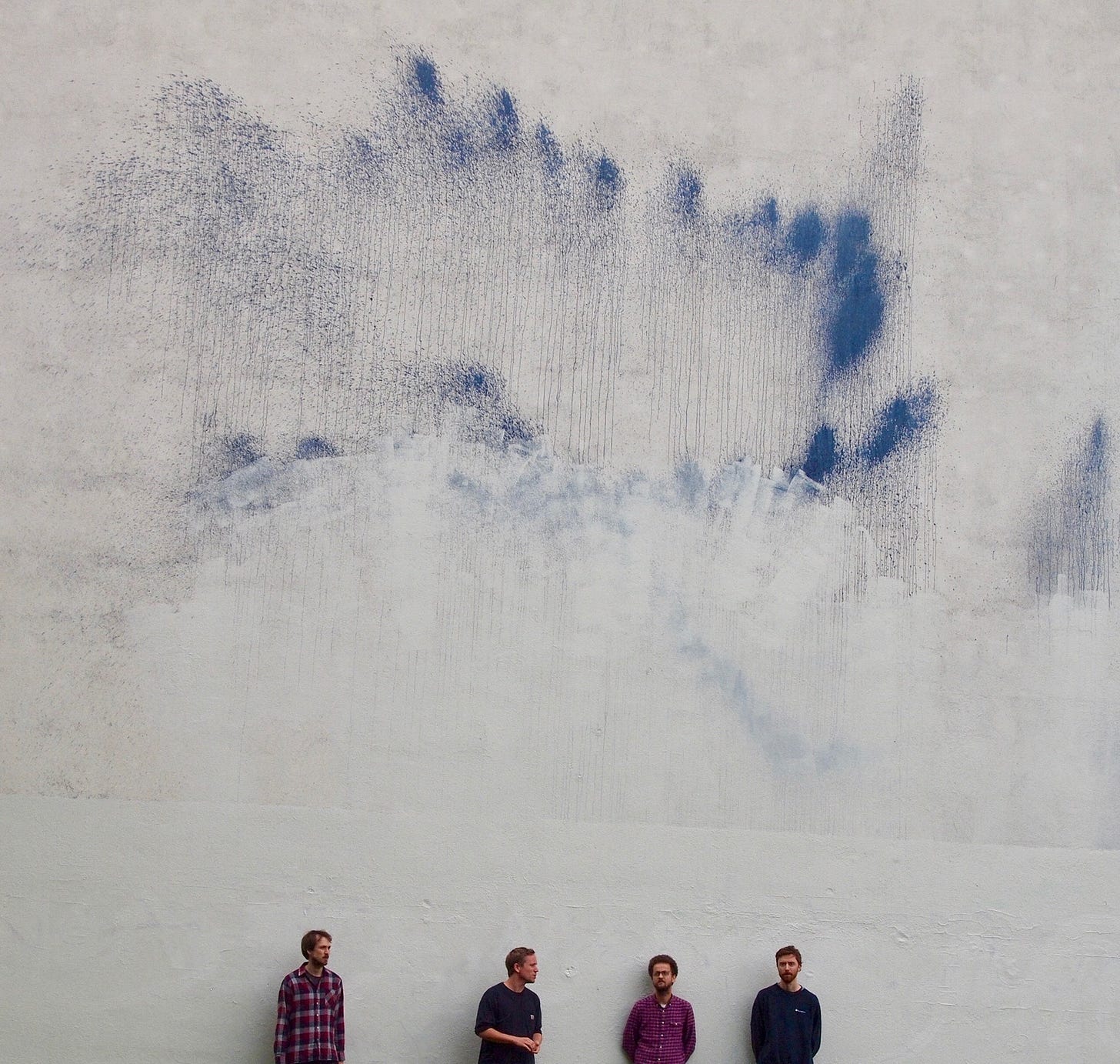Recent recordings from Rob Mazurek and George Dumitriu:
To my mind Rob Mazurek has been on a serious tear, making a string of recordings over the last few years that stand among his finest efforts. He’s been more selective about his schedule, seemingly spending more time developing and focusing his work before entering the studio, but that’s conjecture. What isn’t conjecture is how sharp he’s been with an evolving number of ensembles. In March Mazurek and a new iteration of his long-running Exploding Star Orchestra released Lightning Dreamers (International Anthem), another gem that has insinuated itself within my brain in fits and starts. The album’s opening track “Future Shaman”—which you can listen to below—hit me straight out of the gate, as a stuttering breakbeat interlocks with an irresistible lick traced out by Craig Taborn and Angelica Sanchez on a pair of Wurlitzer keyboards, driving on through shifting permutations, and a brilliant solo from guitarist Jeff Parker. The group line-up is much different than the one on Dimensional Stardust, from 2020. Apart from the leader’s trumpet, the oratory of Damon Locks, and a searching flute excursion by Nicole Mitchell on the decidedly abstract, less groovy “Black River” (that is, until it morphs into a hypnotic, post-Phil Cohran swirl in the final minutes), everything else stems from the rhythm section, with Taborn, Sanchez, and Parker, drummer Gerald Cleaver and percussionist Mauricio Takara.
As with recent live dates, Locks is featured more prominently than ever, giving voice to the futurist/outer space-themed conception of Mazurek’s recent music. Mazurek’s voice is also present, especially on “Black River,” coming in the form of cosmic howls buffeted and muted by the surrounding din, and his trumpet playing remains as fiery, tuneful (in his distinctly Cherry-esque mode). There’s a surprising, brooding late 60s Miles Davis vibe on the closing track “White River,” with Parker’s molten-toned, warmly melodic lines gliding and dripping over Cleaver’s elastic time, the keyboardists unspooling glistening accents and asides as the heat rises. Mazurek and Parker recall their days together in Isotope 217 on “Shape Shifter,” but that thread is part of a much different sonic fabric here, with an aerated looseness not so present decades ago. I caught a weird live performance by ESO in late March at Big Ears, with Locks, Sanchez, Taborn, and Cleaver complemented by drummer Chad Taylor, cellist Tomeka Reid, and guitarist Mary Halvorson, but the leader was suffering from some intense food poisoning, which left him to serve primarily as a conductor—except when his illness forced him offstage for a spell. It was fascinating to hear the band proceed without his direction, even as it foundered at times, bereft of a focused energy, but his vision endured. When he’s locked in as he on this latest recording, the music can’t be denied.
There aren’t many composers in jazz (or any other tradition) that created pieces so instantly recognizable and connected to a single voice as Thelonious Monk. Naturally, a lot of people have performed and recorded his music, and despite a wide range of interpretive choices, technical competence, and taste level, his signature always seems to emerge clearly. But as widely performed as his music remains, it’s pretty hard to improve on his own recordings, where his bands revealed a dazzling internalization of his ideas. Both supporting Monk and in work outside of his band like reedists Steve Lacy and Charlie Rouse, and drummer Ben Riley routinely demonstrated a deep understanding and connection, while plenty of others who worked with him—whether John Coltrane, Coleman Hawkins, Johnny Griffin, Art Blakey, or Milt Jackson—were certainly committed and original enough to lift his music higher even if they weren’t entirely immersed in its complexities.
There’s a certainly a novelty factor in a collection of solo Monk readings performed on viola, but what makes Monk on Viola (Evil Rabbit) so gripping is how George Dumitriu imparts and expands the elliptical phrasing of the composer with such originality and effectiveness. In some ways his approach gets at a particular strain of Monk’s genius—the sense of play, the jaggedness, and the oblique lyricism—as well as anyone. I’ve encountered Dumitriu’s playing in the sublime octet of pianist Kaja Draksler as well as in the trio Black Sea Songs, but I’ve never been able to pick up the luscious grain of his sound and his razor-sharp sense to time so convincingly before. He applies all manner of extended techniques and effects, many connected to classical music far more than jazz-rooted improv, to nine indelible themes, frequently delaying and frustrating the exposition of a particular theme. “Round Midnight” opens with some masterful bow play, as the musician drops it across the bridge and allows it to bounce and skitter, before embracing an irregular rotation of light pressure arco, unpitched scrapes and scratches that transformed into high-pitched harmonics, spare pizz, and terse phrases that sneakily spell out gradually and finally build into something recognizable during the final two minutes. The performance is truly astonishing. Dumitriu manages similar feats, throughout, constantly toying with those themes in a way that celebrates their brilliance. The violist’s deep respect for Monk is made more profound by the way he fucks with the material than if he had played it straight. You can hear his take on “Four in One” below.
Live music on Nowhere Street:
There are two Nowhere Street concerts at KM28 this week. On Tuesday the excellent Norwegian quartet Oker perform, with an opening set by Horse Lords guitarist Owen Gardner and on Friday Die Hochstapler plays two sets.
Oker’s music has crept up on me slowly over the last few years, but seeing them live last year cemented my admiration. As heard on the group’s 2021 album Susurrus (Shhpuma) the music is remarkably subtle and detail oriented, moving patiently through a series of fragile episodes. Each group member composes, but those loose frameworks seems to exist primarily for the way the ensemble interacts and shapes exquisite textures collectively. At times I’m reminded of groups as disparate as Radian, Town & Country, and TK, but Oker carve out their own sound world, inventively colliding unidentifiable folk traditions with minimalism, built upon refined listening and extended techniques. Its four members are remarkably versatile players—trumpeter Torstein Lavik Larsen, guitarist Fredrik Rasten, double bassist Adrian Fiskum Myhr, and drummer Jan-Martin Gismervik—who work in all sorts of contexts. Below you can check out a track The group is preparing to record its third album this fall, so tomorrow’s concert should offer some glimpses of the new material. I can’t say what Gardner’s set will offer, but anyone who’s heard his playing in Horse Lords knows that his needling intensity and microtonal touch are infinitely arresting.
Die Hochstapler is the quartet of double bassist Antonio Borghini, alto saxophonist Pierre Borel, trumpeter Louis Laurain, and drummer Hannes Lingens, and they are one of the best improvising groups at work today. Last year they dropped a pair of connected albums that sought to illustrate their spontaneous working method. On Beauty Lies they presented 25 tracks recorded without an audience —whether seconds-long snippets or full compositions—that laid out the source material for the group’s performances. Within captures two live sets played at Berlin’s sadly defunct Au Topsi Pohl, drawn from the source material on the first album. When the quartet plays each member can draw from the internalized repertoire on the fly, and their cohorts either embrace or reject the suggestions. As terrific as the group’s recordings may be, nothing can compare to seeing the band create music live, where they function like an ensemble of tightrope walkers, perpetually teetering to-and-fro, without ever tumbling. They also move around the performance space, forming and disbanding instrumental subgroupings as if to underline the real-time exercises in counterpoint. You can listen to one of those electrifying live sets below
Recommended concerts in Berlin this week:
May 3: Tilo Weber & Camila Nebbia, Asger Nissen (solo), 8:30 PM, Donau115, Donaustraße 115 12043 Berlin
May 3: Rebecca Lane & Clara de Asis with Sarah Saviet and Deborah Walker, 8 PM, KM28, Karl-Marx-Strasse 28 12043 Berlin
May 4: Raed Yassin: Phantom Orchestra solo, 8:30 PM, Hamburger Bahnhof, Invalidenstrasse 50-51, 10557 Berlin (Part of BROKEN MUSIC Vol. 2_LIVE)
May 5: Martina Bertoni, Bérangère Maximin, 8PM, Galiläakirche / Widerstandsmuseum, Rigaer Straße 9, 10247 Berlin
May 5: Katharina Ernst & Luis Lopes, the Quiet Cue (Michael Renkel & Nicolas Wiese), 8:30 PM, Ausland, Lychener Straße 60, 10437 Berlin
May 7: Tasten Saiten Holz (Magda Mayas & Andrea Neumann), 4 PM, Satellit, Weinstr. 11, 10249 Berlin






